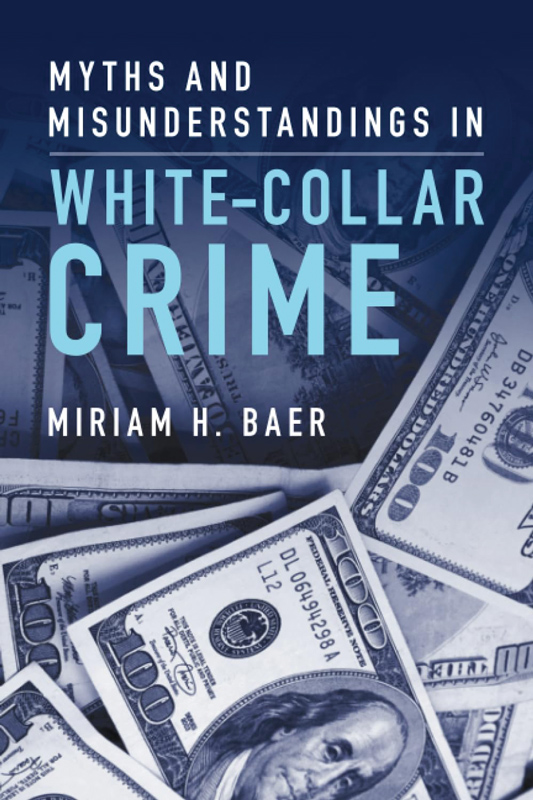Faculty Scholarship
NEW IN FACULTY BOOKS

Myths and Misunderstandings in White-Collar Crime (Cambridge University Press, 2023)
USING REAL-WORLD EXAMPLES to explore the pathologies that hamper our ability to understand and redress white-collar crime, Baer’s book provides a step-by-step framework for reorienting the ways in which we prohibit, enforce, and discuss white-collar crime.
For-Profit Philanthropy: Elite Power and the Threat of Limited Liability Companies, Donor-Advised Funds, and Strategic Corporate Giving (Oxford University Press, 2023)
EXPOSING A MIGRATION of business practices, players, and norms into philanthropy, co-author Brakman Reiser explains how this shift strains the regulatory regime sustaining public trust in elite generosity through accountability and transparency, and how to restore that trust.
Broker-Dealer Compliance: A Case-based Guide to Compliance Program Elements and Practices (Edward Elgar, 2023)
A COMPREHENSIVE GUIDE that reviews the state of broker-dealer compliance, from both general and practical perspectives, Fanto’s book makes use of legal scholarship and behavioral and organizational literature on compliance.
Family Life, Family Law, and Family Justice: Tying the Knot (Routledge, 2023)
COMBINING HISTORY, SOCIAL SCIENCE, AND LEGAL ANALYSIS, Garrison charts the evolution and interdependence of family life and family law, portrays current trends in family life, explains the pressing policy challenges these trends have produced, and analyzes the essential family law changes needed to meet these challenges.
The American Law Institute: A Centennial History (Oxford Academic, 2023)
IN HONOR OF the American Law Institute’s Centennial, the book features a series of original essays authored by leading experts in their fields, including contract, tort, property, and criminal law, often including current and former restatement reporters, and is co-edited by Gold.

Advanced Introduction to US Civil Liberties (Edward Elgar, 2023)
HERMAN’S KALEIDOSCOPIC overview of key U.S. civil liberties, includes freedom of speech, press, assembly, and religion; limitations on search and seizure, due process in criminal proceedings, autonomy rights, rights of equality, and democratic participation.

Radical Acts of Justice: How Ordinary People Are Dismantling Mass Incarceration (The New Press, 2023)
THE ANSWER TO MASS INCARCERATION lies not with experts and pundits but with ordinary people taking extraordinary actions together, Simonson writes in her new book, which examines the many ways people unite to reconceive ideas of justice and safety.
Dialogue Debunking the Section 1031 Holding Period Myth, Tax Notes Federal, V. 179, p. 43 (April 3, 2023)
USING A HYPOTHETICAL DIALOGUE between a tax adviser and an exchanger, Borden shows that the Section 1031 qualified use requirement does not impose a holding period requirement, and that suggestions otherwise appear based solely on perceptions of the likelihood of audit or the issue being raised on audit, which factors are prohibited in giving tax advice.
White Is Right: The Racial Construction of Effective Assistance of Counsel, 98 New York University Law Review 770 (2023)
EXAMINING THE RACE-CONSTRUCTING ROLE the ineffective assistance of counsel standard plays in determining whether a defendant received effective representation, Hoag-Fordjour outlines a structural framework for understanding right to counsel jurisprudence.
Stories from the Negative Spaces: United States v. Thind and the Narratives of (Non)Whiteness, 74 Mercer Law Review 801 (2023)
THE SUPREME COURT’S DECISION in United States v. Bhagat Singh Thind, which turned a century old this year, remains relatively unknown. But its impact is monumental when it comes to the history of Asians—particularly South Asians—in America. The case captures its historical moment and provides lessons in the ways we understand race, citizenship, and what it means to be an American today.
Data Property, 72 American University Law Review 829 (2023) (with James Grimmelmann)
DATA HAS BECOME one of society’s most important resources, but property law does not recognize intangible data itself as an asset that can be owned. In Data Property, the authors propose a new framework for recognizing non-exclusive, personal-property-like rights in data.
Criminal Terms, 107 Minnesota Law Review 1495 (2023)
ALTHOUGH RECENT LEGAL SCHOLARSHIP has identified subtle ways in which we send pro-carceral messages, vocabulary change has not been part of the scholarship, but it should be, in recognition of the harm that such messages can do.
The Immigration Shadow Docket, 117 Northwestern University Law Review 893 (2023)
EACH YEAR, THE BOARD OF IMMIGRATION APPEALS (BIA), which reviews decisions of immigration judges and decides the fate of thousands of noncitizens, publicly issues 20 to 30 published, precedential decisions. But most of the BIA’s decision-making happens on its unpublished “immigration shadow docket,” whose harms include the creation of “secret law” that is largely inaccessible to the public.